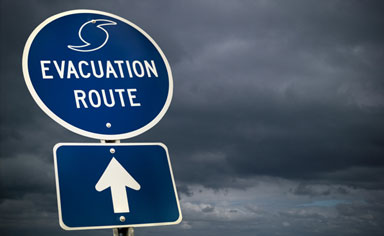|
|
| Isaac Ginis with Senator Jack Reed |
Most of the mature trees in coastal New England will be down. There will be no water or electricity. Citizens will be
completely cut off for a week to ten days. This is the scenario that Dr. Isaac Ginis believes will face coastal New
England when – not if – the next Category 3 or greater hurricane hits the region. And he feels it is his duty to help
prepare the public for this eventuality. "If I as a scientist can contribute to increasing public awareness, I think it's
an important mission I can fulfill," says Isaac.
As a result Isaac has given several presentations to the Rhode Island National Guard, first working with them in 2006
through their State Partnership Program, in which Isaac provided expertise on hurricane preparedness. In 2011 they called
on Isaac again. He spoke to Army, Air Force and National Guard personnel as they wrote their state hurricane emergency
management plan. During a day-long workshop, Isaac presented an overview of how hurricanes develop, how technology is
used to forecast hurricane movements, and identified the contingencies that the planners need to be aware of and explore,
such as roadblocks caused by downed trees and storm surge.
One challenge Isaac addressed is dealing with an unprepared public. The New England region has not been hit by a major
hurricane since 1938, and as a result, the general public may not know how to prepare. A recent survey done of University
of Rhode Island staff revealed that only 20 percent had an evacuation plan. During Isaac’s training with the National
Guard a commanding order was issued, stating that all National Guard families must have evacuation plans.
"Prepare to deal with a completely unprepared population." |
Isaac also helped the National Guard planners understand the nature of hurricane forecasting. "I teach them that in real
life we won't know precisely where the hurricane is going," says Isaac. "They have to understand uncertainties."
Hurricanes in the Northeast often move much faster than those in the Gulf of Mexico, giving the National Guard – and the
public - perhaps only 48 hours to prepare. For training, the Guard uses historical tracking data from the 1938 hurricane.
"In practice we will never have this confidence about where the storm will be," says Isaac. "We will not be confidant
where the hurricane will make landfall, and decisions will be made with uncertainties." The Guard found it helpful to
understand the level of uncertainty, how forecasts are made and how to interpret them, including the actual meaning of
the cone of uncertainty. "Being able to resource a world-class expert is unique," says Major Mike Manning of the Rhode
Island National Guard. "In the short term we want to get the hurricane plan written, but it's all in support of the
state mission – how best to provide a coordinated response and take care of citizens."



